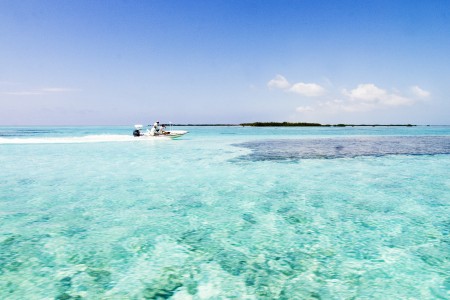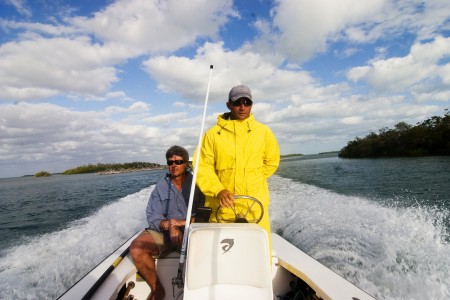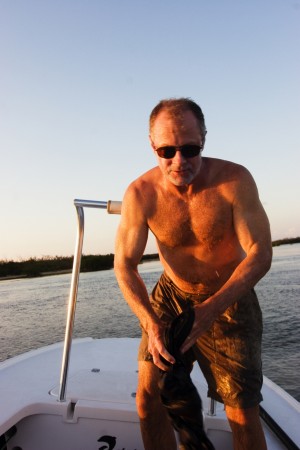You can’t think about it or you’d go crazy. I mean, you know the water is only a foot deep in places because Rigo cranks the skiff hard right or hard left when you go over the dark splotches of turtle grass and the engine whines so high it sounds like it’s going to explode. And you’ve been a thousand, two thousand feet off-shore when Rigo has told you to get out of the boat and you say, “Here?” and he nods and you get out thinking you’re going to sink to your waist but the water only comes up to your ankles and you’re standing in some thick primordial goo populated by stingrays and conch and jellyfish.
And then there’s night fishing when you make the run back to Halcón in pitch-blackness, the world so dark there is no dividing line between night and ocean, and so as not to be distracted, or perhaps just because they think it’s fun, the guides glide along the reef line without running lights and for twenty or thirty minutes you bounce over the water at 35 or 40 mph, the tropical breeze slapping your face like a flag whipping in the wind, and you just don’t allow yourself to imagine what would happen if you hit a massive piece of corral rising out of the ocean like a whale’s back or a drifting piece of sea-worn lumber or a half-submerged tree trunk.
You don’t think about it because it will drive you crazy if you do. The last thing you want to do is imagine the sound of your Dolphin skiff ripping open as the bottom is sheared by the reef or ponder the odds of survival should the boat go from 40 to 0 in less than a second and you were hurled out of the skiff like a cow from a catapult, landing face-first in shallow water where your neck would collapse and roll hideously beneath your chest as your forehead impacted with coral dark and rough.
No, you don’t think about it because it’s never going to happen, right? I mean, these Cubans make their living running the archipelago. They can speed through mangrove channels where you couldn’t paddle a kayak because they know the one line through the thick growth where the water is still deep enough to allow the flat-bottom boats, even if they do turn up mud and sometimes foul the propellers with turtle grass going through.
Still, I prefer to sit in the back of the skiff, next to the guide. Because if I ever did think about us hitting the bottom of the reef, and I never do, I would think that I would have a better chance of surviving if I was launched from further back in the boat. So that I would clear the U-shaped bars in the front of the Dolphin. Like a football going up and over the uprights of a fieldgoal post.
Which is why Peter was sitting in the front and not me when Rigo made a minor miscalculation as we were jetting at more than 40 mph over a section of very shallow water and we stuck the propeller into the thick mud beneath a wide patch of turtle grass and the boat came to an immediate stop, as did my heart, and Rigo and I slammed chest-first into the steering column and then I bounced off that and went sideways, onto the floor of the boat, facedown, and when I looked up Rigo was peeling himself off the wheel and Peter was nowhere to be seen.
And then he popped up. Out of the water. About 15 or 20 feet past the boat. Looking dazed and confused, but not broken. I mean, his legs worked and it looked like his arms worked and I didn’t see any blood on his face or bare chest. He stumbled drunkenly back to the skiff, sort of fell in over the side, breathing heavily, his face ashen.
“I flew through the U-posts,” he said. “Fucking unbelievable. I flew right through the fuckers.”
And that is how he managed to survive unscathed. When the boat had abruptly stopped, he’d been propelled between two pieces of metal not more than two feet wide and three feet high, cleared it without a scratch, and then zoomed a foot or so above the cerulean sea, like a six-foot-tall flying fish, landing belly-down and skipping like a stone over the water. Without breaking his neck or his back or even the plastic bottle of water he’d been holding in his hand at the time. Which he still held. Though now his hand was shaking. Like the rest of his body.
So now we know what happens if the skiff does run aground. At least we know what happens if you’re very, very lucky.
Tags: Cuba, Jardines de la Reina




Recent Comments